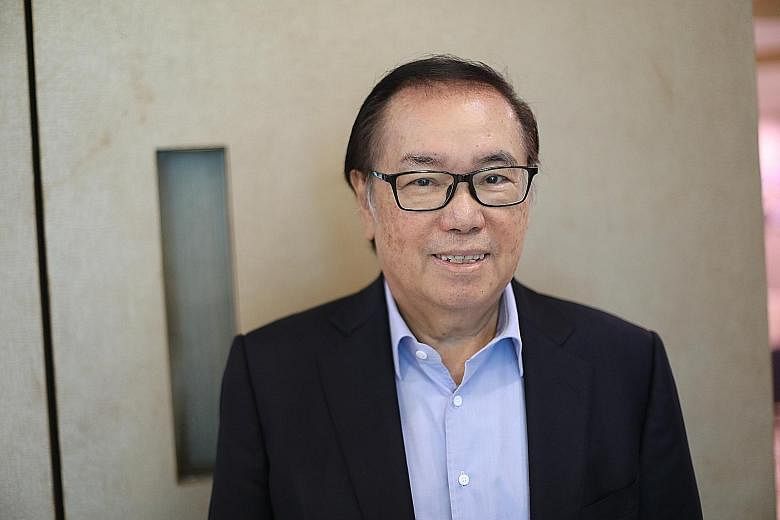It may seem that employers and workers would have competing concerns amid the Covid-19 crisis, but the challenges are showing that the way ahead lies in cooperation, said National Wages Council (NWC) chairman Peter Seah.
Mr Seah told The Sunday Times last week: "It's even more critical now for both employers and workers to work together to say, how do we... emerge together well when the Covid situation is over.
"The endgame is the recovery of our economy because if it doesn't recover, the companies cannot survive, you know, the impact on workers is very obvious."
Still, the tripartite talks are not going to be easy when the council meets again, said Mr Seah, 73.
"On the part of businesses, the challenge is how do you stay healthy and survive the crisis. Obviously for the workers it's how is workers' welfare taken care of, how do we protect jobs?" he said.
Mr Seah was speaking to The Sunday Times after Manpower Minister Josephine Teo said earlier this month that the council, which comprises employer, union and government representatives, would convene for a second time this year.
This will occur later this month with the council aiming to release updated guidelines by next month.
The labour market situation has worsened considerably since March, when the council recommended that companies first reduce non-wage costs and tap government support before looking to reduce staff wages.
Retrenchment should be a last resort.
Mr Seah would not be drawn into speculating on the exact measures the council will consider this time, but he expects that protecting jobs - especially for the Singaporean core - will be a major topic.
"The stress on the companies is far greater than in normal times, so the probability of companies running into problems... is far greater, and when that happens the ultimate outcome is that workers will lose their jobs," he said.
Continuing dialogue is needed between employers, staff and unions to understand the challenges businesses are facing and to work out a solution that minimises the pain for workers.
This could include no-pay leave or allowing workers to take on a second job, said Mr Seah, who has been chairing the NWC since 2015. He also chairs DBS Bank and Singapore Airlines.
-
How the council formulates guidelines
-
National Wages Council chairman Peter Seah has given a rare glimpse into how the tripartite body formulates guidelines.
He noted that there are usually three meetings before a media briefing but a lot of work goes on behind the scenes before the council meets.
The key partners - the National Trades Union Congress (NTUC), Singapore National Employers Federation and Ministry of Manpower - meet several weeks in advance to discuss key issues to bring to the council's attention.
Mr Seah told The Sunday Times that part of the process involves the Government producing a big-picture paper on the economic context and data for the council to consider.
Public feedback is also made available to council representatives, who, besides Mr Seah, comprise 21 members from employer groups and chambers, unions and the NTUC, and the Government.
The biggest discussions involve employers and unions debating one another's proposals, Mr Seah said.
The government group responds to requests or comes up with policies that best take care of the interests of companies and workers and, in turn, the interests of the economy, he added.
Eventually, the three parties reach a "landing point" acceptable to all, said Mr Seah, adding that he has not encountered a situation during his chairmanship where a vote was needed.
"To be frank about it, because the parties are of the right mindset and have a shared mission, as chairman it's not too difficult for me to get them to agree with one another," he said.
He added that the discussions and range of views from members are important for one other to hear.
Although the guidelines are not legally binding, they are adopted by a substantial number of firms.
Last year, for instance, 60.1 per cent of private sector establishments with at least 10 staff followed the council's pay raise recommendation for low-wage workers, official data noted. Council members can help to persuade firms to adopt the recommendations as well, said Mr Seah.
"I think the fact that there is quite extensive implementation... also reflects the fact that the policies came out of a lot of discussions between the tripartite partners, and companies and workers in general feel that these address their interests," he said.
Joanna Seow
Helping low-wage workers is another area the council is likely to continue to focus on, he added.
The council urged employers in March to give special consideration to workers earning up to $1,400 a month - freeze their pay if there are company-wide wage cuts and consider raising their pay if a wage freeze is planned.
Issues such as the salary ceiling for workers to be considered low-wage and the quantum of pay rise recommended have been debated quite extensively, although at the end of the day unions and companies both agree that all have a duty to take care of low-wage workers, said Mr Seah.
Employers and workers may also be concerned about government aid being scaled back. "How do we then move forward to keep companies afloat and then to protect the jobs of workers?" he said.
Mr Seah also noted that the pandemic appears to be accelerating digitalisation and highlighting the need for workers to reskill and upskill, trends the council has already been addressing.
Certain issues can be debated extensively, he said, but the spirit of give and take for the general good always prevails.
"The strength of our tripartism is that all parties are guided principally by what is best for the economy (and) our country. That has enabled the partners to always come up with very balanced solutions for businesses and workers."


